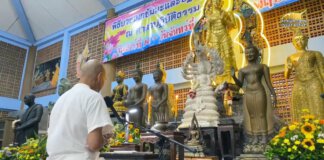ฆราวาสสอนธรรม รอบที่สองดูกันอีกครา
๙ มกราคม ๒๕๖๘
***********************
สังโยชนสูตร
สมัยหนึ่ง ภิกษุผู้เถระมากด้วยกันอยู่ที่อัมพาฏกวัน ใกล้ราวป่ามัจฉิกาสณฑ์ ก็สมัยนั้นแล ภิกษุผู้เถระมากด้วยกันกลับจากบิณฑบาตภายหลังภัตนั่งประชุมสนทนากันที่โรงกลมได้สนทนากันว่า ดูกรท่านผู้มีอายุทั้งหลาย ธรรมเหล่านี้ คือสังโยชน์ก็ดี สังโยชนียธรรมก็ดี มีอรรถต่างกัน มีพยัญชนะต่างกันหรือว่ามีอรรถเหมือนกัน พยัญชนะเท่านั้นต่างกัน บรรดาภิกษุผู้เถระเหล่านั้น ภิกษุผู้เถระบางพวกพยากรณ์อย่างนี้ว่า ดูกรท่านผู้มีอายุทั้งหลาย ธรรมเหล่านี้ คือ สังโยชน์ก็ดี สังโยชนียธรรมก็ดี มีอรรถต่างกันและมีพยัญชนะต่างกัน บางพวกพยากรณ์อย่างนี้ว่า ดูกรท่านผู้มีอายุทั้งหลาย ธรรมเหล่านี้ คือ สังโยชน์ก็ดี สังโยชนียธรรมก็ดี มีอรรถเหมือนกัน พยัญชนะเท่านั้นต่างกัน ฯ
ก็สมัยนั้นแล จิตตคฤหบดีได้ไปยังบ้านส่วยชื่อมิคปถกะด้วยกรณียกิจบางอย่าง ได้สดับข่าวว่า ภิกษุผู้เถระมากด้วยกันกลับจากบิณฑบาตภายหลังภัตแล้ว นั่งประชุมกันที่โรงกลม ได้สนทนากันว่า ดูกรท่านผู้มีอายุทั้งหลายธรรมเหล่านี้ คือ สังโยชน์ก็ดี สังโยชนียธรรมก็ดี มีอรรถต่างกัน มีพยัญชนะต่างกัน หรือว่ามีอรรถเหมือนกัน พยัญชนะเท่านั้นต่างกัน บรรดาภิกษุผู้เถระเหล่านั้น ภิกษุผู้เถระบางพวกพยากรณ์อย่างนี้ว่า ดูกรท่านผู้มีอายุทั้งหลาย ธรรมเหล่านี้ คือ สังโยชน์ก็ดี สังโยชนียธรรมก็ดี มีอรรถต่างกันและมีพยัญชนะต่างกัน บางพวกพยากรณ์อย่างนี้ว่า ดูกรท่านผู้มีอายุทั้งหลาย ธรรมเหล่านี้ คือ สังโยชน์ก็ดีสังโยชนียธรรมก็ดี มีอรรถเหมือนกัน พยัญชนะเท่านั้นต่างกัน ฯ
ครั้งนั้นแล จิตตคฤหบดีได้เข้าไปหาภิกษุผู้เถระทั้งหลายถึงที่อยู่ไหว้แล้วนั่ง ณ ที่ควรส่วนข้างหนึ่ง ครั้นแล้วได้ถามภิกษุผู้เถระทั้งหลายว่า ข้าแต่ท่านทั้งหลายผู้เจริญ กระผมได้สดับข่าวว่า ภิกษุผู้เถระมากด้วยกันกลับจากบิณฑบาตภายหลังภัตแล้ว นั่งประชุมกันที่โรงกลม ได้สนทนากันว่า ดูกรท่านผู้มีอายุทั้งหลาย ธรรมเหล่านี้ คือ สังโยชน์ก็ดี สังโยชนียธรรมก็ดี มีอรรถต่างกัน มีพยัญชนะต่างกัน หรือว่ามีอรรถเหมือนกัน พยัญชนะเท่านั้นต่างกัน ภิกษุผู้เถระ บางพวกพยากรณ์อย่างนี้ว่า
ดูกรท่านผู้มีอายุทั้งหลาย ธรรมเหล่านี้ คือ สังโยชน์ก็ดี สังโยชนียธรรมก็ดี มีอรรถต่างกันและมีพยัญชนะต่างกัน บางพวกพยากรณ์อย่างนี้ว่า ดูกรท่านผู้มีอายุทั้งหลาย ธรรมเหล่านี้ คือ สังโยชน์ก็ดี สังโยชนียธรรมก็ดี มีอรรถเหมือนกัน พยัญชนะเท่านั้นต่างกัน ดังนี้หรือ ภิกษุเหล่านั้น ตอบว่า อย่างนั้นคฤหบดี จิตตคฤหบดีได้กล่าวว่า ข้าแต่ท่านผู้เจริญทั้งหลายธรรมเหล่านี้ คือ สังโยชน์ก็ดี สังโยชนียธรรมก็ดี มีอรรถต่างกัน และมีพยัญชนะต่างกัน ถ้ากระนั้นกระผมจักอุปมาให้ฟัง เพราะวิญญูชนบางพวกในโลกนี้ย่อมเข้าใจเนื้อความแห่งภาษิตแม้ด้วยข้ออุปมา
ข้าแต่ท่านผู้เจริญทั้งหลาย เปรียบเหมือนโคดำตัวหนึ่งโคขาวตัวหนึ่ง เขาผูกด้วยทามหรือเชือกเส้นเดียวกัน ผู้ใดแลพึงกล่าวอย่างนี้ว่า โคดำติดกับโคขาว โคขาวติดกับโคดำ ดังนี้ ผู้นั้นชื่อว่ากล่าวถูกละหรือ
ภิกษุเถระจึงได้กล่าวว่า ไม่ถูก คฤหบดี เพราะโคดำไม่ติดกับโคขาว แม้โคขาวก็ไม่ติดกับโคดำ ทามหรือเชือกที่ผูกโคทั้งสองนั้น ชื่อว่าเป็นเครื่องผูก ฯ
จิตตคฤหบดีกล่าวว่า ข้าแต่ท่านผู้เจริญทั้งหลาย ฉันนั้นเหมือนกันแล จักษุไม่ติดกับรูปรูปไม่ติดกับจักษุ ฉันทราคะที่เกิดขึ้นเพราะอาศัยจักษุและรูปทั้ง ๒ นั้น ชื่อว่าเป็นเครื่องติด หูไม่ติดกับเสียง เสียงไม่ติดกับหู ฉันทราคะที่เกิดขึ้นเพราะอาศัยหูและเสียงทั้ง ๒ นั้น ชื่อว่าเป็นเครื่องติด จมูกไม่ติดกับกลิ่น กลิ่นไม่ติดกับจมูก ฉันทราคะที่เกิดขึ้นเพราะอาศัยจมูกและกลิ่นทั้ง ๒ นั้น ชื่อว่าเป็นเครื่องติด ลิ้นไม่ติดกับรส รสไม่ติดกับลิ้น ฉันทราคะที่เกิดขึ้นเพราะอาศัยลิ้นและรสทั้ง ๒ นั้นชื่อว่าเป็นเครื่องติด กายไม่ติดกับโผฏฐัพพะ โผฏฐัพพะไม่ติดกับกาย ฉันทราคะ ที่เกิดขึ้นเพราะอาศัยกายและโผฏฐัพพะทั้ง ๒ นั้น ชื่อว่าเป็นเครื่องติด ใจไม่ติดกับธรรมารมณ์ ธรรมารมณ์ไม่ติดกับใจ ฉันทราคะที่เกิดขึ้นเพราะอาศัยใจและธรรมารมณ์ทั้ง ๒ นั้น ชื่อว่าเป็นเครื่องติด
ภิกษุเถระจึงได้กล่าวว่า ดูกรคฤหบดี การที่ปัญญาจักษุของท่านหยั่งทราบในพระพุทธพจน์ที่ลึกซึ้ง ชื่อว่าเป็นลาภของท่าน ท่านได้ดีแล้ว ฯ
จบฆราวาสสอนธรรม รอบสองเอาไว้แค่นี้ก่อนนะจ๊ะ โอกาสหน้าเราทั้งหลายมาตามดูฆราวาสสอนธรรมในรอบต่อไป
เจริญธรรม
พุทธะอิสระ
——————————————–
อ่านย้อนหลัง : https://www.facebook.com/buddha.isara/posts/pfbid0xUVce9vs91Pk6pfSLtUzqTSoFEaNiLjRjo8KVUaknnE3EA1kemNzWRftBeKyQXXGl
——————————————–
Laity’s teaching Dhamma, let’s learn about it for the second time.
January 9, 2025
***********************
Saṅyojana Sutta
Many older monks once stayed at Ampadaka, near the Macchikasandr Forest. At that time, older monks, after their meals from alms round, were sitting together in a round hall discussing,
“Venerables, do phenomena, namely, saṅyojana (fetters that bind humans to cycles of rebirth) and saṅyojana-dhamma (natural conditions of the fetters) have different meanings and consonants, or have the same meanings but different consonants?”
Among those older monks, some of them predicted: “Venerables, these phenomena, namely, fetters and conditions of fetters, have different meanings and consonants.”
Some predicted this: “Venerables, these phenomena, namely, fetters and conditions of fetters, have the same meaning. Only their consonants differ.”
At that time, Citta Gahapati had gone to the village of Migapathaka on some business. He heard of a group of older monks who, after having meals from their alms round, were sitting together in a round hall.
They were discussing, “Venerables, do these phenomena, namely, the fetters and conditions of fetters, have different meanings and consonants, or do they have the same meanings but different consonants?”
Among those older monks, some of them predicted thus: “Venerables, these phenomena, namely, the fetters and conditions of fetters, have different meanings and consonants.
Some of them predicted thus: “Venerables, these phenomena, namely, the fetters and conditions of fetters, have the same meanings but different consonants.”
At that time, Citta Gahapati approached the older monks, paid homage, and sat down respectfully to one side. Then, he asked the older monks: Venerable sirs, I have heard that many older monks, after having meals from alms round, sat together in the round hall and discussed: “Venerable sirs, are these phenomena, namely, the fetters and fetter’s phenomena, different in meaning and consonants, or do they have the same meaning but different consonants?”
Some of the older monks predicted this: “Venerable sirs, are these phenomena, namely, the fetters and fetter’s phenomena, different in meaning and consonants?”
Some of them predicted this: “Venerable sirs, are these phenomena, namely, the fetters and fetter’s phenomena, different in meaning and consonants, or do they have the same meaning but different consonants?”
Those monks replied: “Yes, householder.” Citta Gahapati said: “Venerable sirs, are these phenomena, namely, the fetters and fetter’s phenomena, different in meaning and consonants.” In that case, I will give you an analogy, because some wise people understand the proverb’s meaning by analogy.
Venerable sirs, it is like one black cow and one white cow are tied together with the same rope. If someone were to say, “The black cow is attached to the white cow, the white cow is attached to the black cow,” would that person speak correctly?
The older monk said, “That is not true, householder, because the black cow is not attached to the white cow, nor is the white cow attached to the black cow. The rope that ties the two cows is called a binding device.”
“Venerable sirs, it is the same. The eye is not attached to the physical body; the physical body is not attached to the eye. The desire arising in connection with the eye and physical body is called a binding device.
The ear is not attached to sound, sound is not attached to the ear. The desire arising in connection with the ear and sound is called a binding device.
The nose is not attached to smell, smell is not attached to the nose. The desire arising in connection with the nose and smell is called a binding device.
The tongue is not attached to taste, taste is not attached to the tongue.” The desire arising in connection with the tongue and the flavors is called a clinging factor.
The body does not cling to the tangible objects, the tangible objects do not cling to the body. The desire arising in connection with the body and the tangible objects is called a clinging factor.
The mind does not cling to the mental objects, the mental objects do not cling to the mind. The desire arising in connection with the mind and the mental objects is called a clinging factor.
The older monk then said, “Householder, your perceptive wisdom has comprehended the profound words of the Buddha; it is your fortune. You have done well.”
That’s the end of the second round of laity’s teaching Dhamma. Let’s leave it here for now. In the next episode, we will see more of the laity’s teachings of Dhamma.
I wish you progress in practicing Dhamma.
Buddha Isara
——————————————–
Previous article : https://www.facebook.com/buddha.isara/posts/pfbid0xUVce9vs91Pk6pfSLtUzqTSoFEaNiLjRjo8KVUaknnE3EA1kemNzWRftBeKyQXXGl






